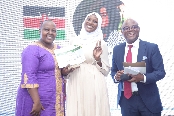The African Agricultural Technology Foundation (AATF), through its Open Forum on Agricultural Biotechnology in Africa (OFAB) project, marked the 4th annual OFAB Day by celebrating African scientists whose groundbreaking innovations are shaping the future of agricultural biotechnology.
This year’s OFAB event brought together policymakers, lawyers, researchers, students, and agricultural stakeholders to honor these leaders for their contributions to advancing science, addressing food and nutritional security challenges, and combating misinformation surrounding biotechnology.
Among the notable honorees was 27-year-old Fatma Mohamed Omar, a graduate of Jomo Kenyatta University of Agriculture and Technology (JKUAT). Fatma has been instrumental in advancing Kenya’s agricultural sector through her research in biotechnology, molecular biology, and bioinformatics. Her work in microbial genomics aims to protect coconut crops along Kenya’s coast from harmful pathogens, directly benefiting local farmers. Beyond her research, Fatma has emerged as a prominent advocate for science communication, using media platforms to demystify agricultural biotechnology and highlight its potential benefits.
During the event, Kilifi Deputy Governor Hon. Flora Mbetsa Chibule emphasized the importance of effective science communication to bridge technological advances with public understanding. She encouraged the scientific community to make complex innovations accessible, ensuring that advances in agriculture reach and benefit local communities.
Dr. Canisius Kanangire, Executive Director of AATF, reflected on OFAB’s growth, noting its expansion to 16 African countries. He highlighted the forum’s role in fostering informed discussions around agricultural biotechnology and dispelling misconceptions. Dr. Kanangire underscored the need for collaborative efforts to address Africa’s food security challenges, noting, “Biotechnology provides a vital pathway to develop crops that are more resilient to climate change, pests, and diseases. By equipping farmers with these tools, we are strengthening our food systems to withstand future challenges.”
The event also recognized other distinguished scientists and contributors from across the continent. Dr. Oumar Traoré from Burkina Faso, a plant molecular virologist, was honored for his work in biosafety and biotechnology projects, including BT cotton and genome-edited rice. Nigerian farmer Usman Abubakar was commended for his successful adoption of BT cotton, transforming his livelihood and community agricultural practices. Ethiopia’s Dr. Diriba Geleti was recognized for his contributions to biotechnology policies that have strengthened the country’s agricultural sector, while Zanzibar’s Dr. Omar Dadi Shajak was celebrated for his work in developing biosafety regulations for sustainable growth.
Ghana’s Dr. Mumuni Abudulai, Malawi’s Prof. Wisdom Changadeya, Rwanda’s Hon. Francoise Uwumukiza, and Mozambique’s Prof. Maria Zélia Lopes Menete were also honored for their contributions in areas such as pest management, biotechnology awareness, gender equality, and climate-smart agriculture.
The honorees pledged to continue driving agricultural innovation in their countries, using the recognition as motivation to inspire the next generation of scientists and foster progress in agricultural biotechnology across Africa.


